Readings Newsletter
Become a Readings Member to make your shopping experience even easier.
Sign in or sign up for free!
You’re not far away from qualifying for FREE standard shipping within Australia
You’ve qualified for FREE standard shipping within Australia
The cart is loading…






Many accounts of critical pedagogy, particularly accounts of trying to enact it within higher education (HE), express a deep cynicism about whether it is possible to counter the ever creeping hegemony of neo-liberalism, neo- conservatism and new managerialism within Universities. Hopeful Pedagogies in Higher Education acknowledges some of these criticisms, but attempts to rescue critical pedagogy, locating some of its associated pessimism as misreading of Freire and offering hopeful avenues for new theory and practice. These misreadings are also located in the present, in the assumption that unless change comes within the lifetime of the project, it has somehow failed. Instead, this book argues that a positive utopianism is possible. Present actions need to be celebrated, and cultivated as symbols of hope, possibility and generativity for the future - which the concept of hope implies. The contributors make the case for celebrating the pedagogies of HE that operate in liminal spaces - situated in the spaces between the present and the future (between the world as it is and the world as it could be) and also in the cracks that are beginning to show in the dominant discourses.
$9.00 standard shipping within Australia
FREE standard shipping within Australia for orders over $100.00
Express & International shipping calculated at checkout
Many accounts of critical pedagogy, particularly accounts of trying to enact it within higher education (HE), express a deep cynicism about whether it is possible to counter the ever creeping hegemony of neo-liberalism, neo- conservatism and new managerialism within Universities. Hopeful Pedagogies in Higher Education acknowledges some of these criticisms, but attempts to rescue critical pedagogy, locating some of its associated pessimism as misreading of Freire and offering hopeful avenues for new theory and practice. These misreadings are also located in the present, in the assumption that unless change comes within the lifetime of the project, it has somehow failed. Instead, this book argues that a positive utopianism is possible. Present actions need to be celebrated, and cultivated as symbols of hope, possibility and generativity for the future - which the concept of hope implies. The contributors make the case for celebrating the pedagogies of HE that operate in liminal spaces - situated in the spaces between the present and the future (between the world as it is and the world as it could be) and also in the cracks that are beginning to show in the dominant discourses.